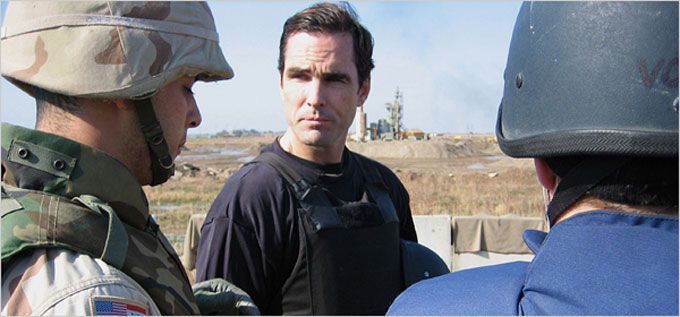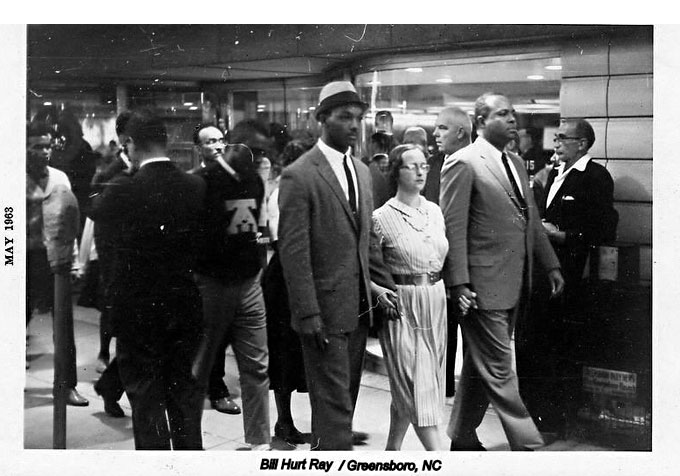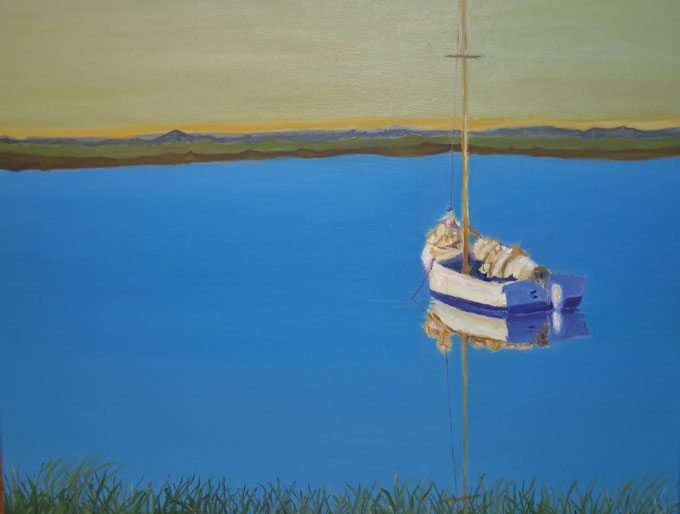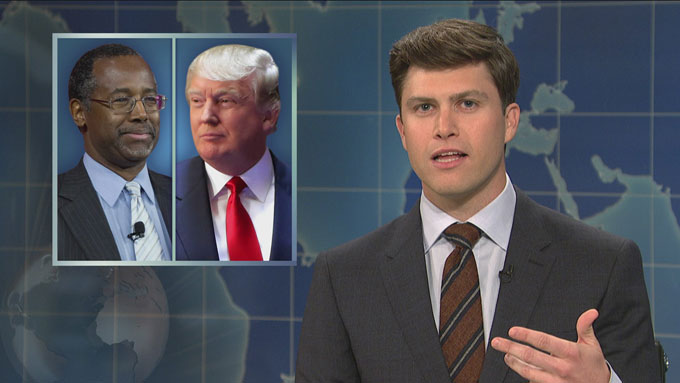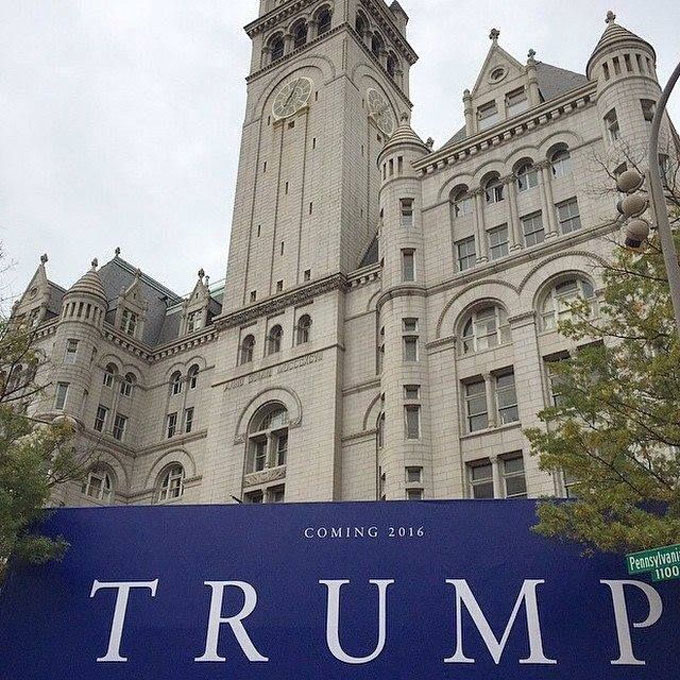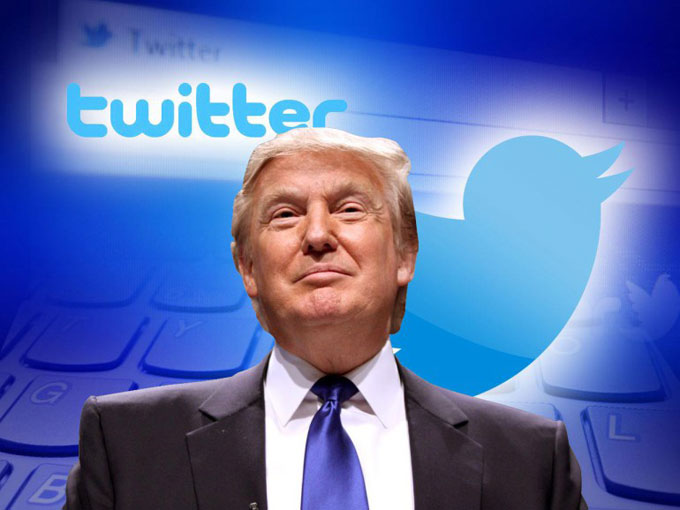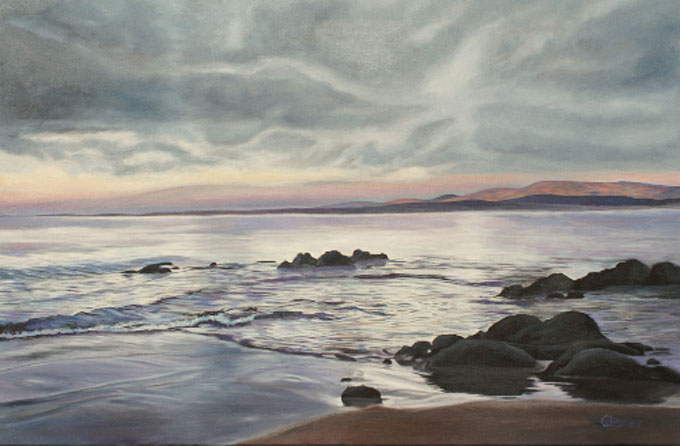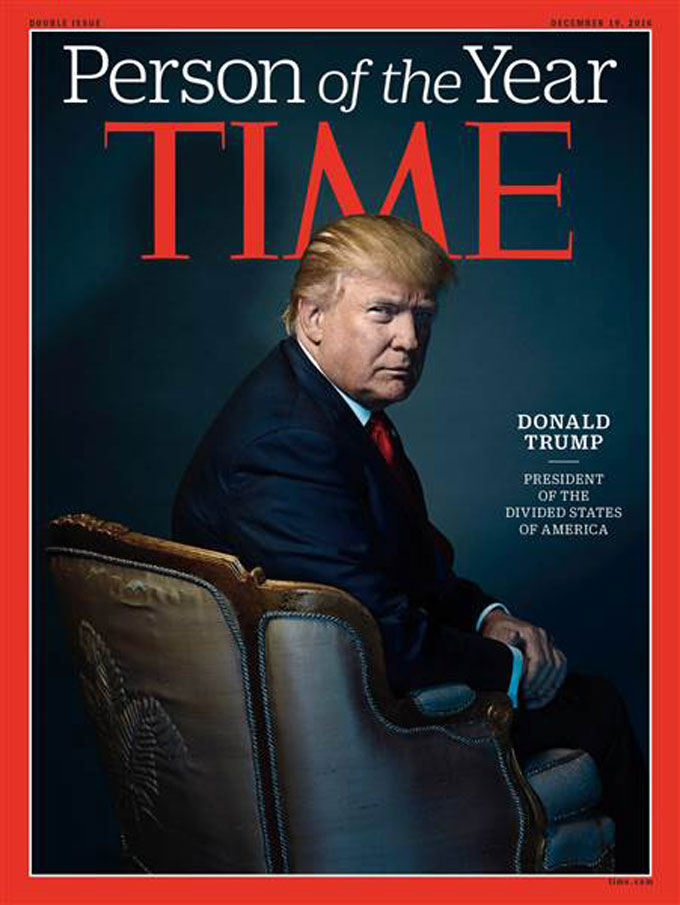Bob Woodruff, the ABC News correspondent who was badly wounded in 2006 by an explosive device while embedded with troops in Iraq, will receive the 2017 John Steinbeck “In the Souls of the People” award at a 7:30 p.m., February 21 event in the San Jose State University Student Union. The award is given annually by the school’s Martha Heasley Cox Center for Steinbeck Studies to an artist, writer, or activist whose life and work emulate the values embodied by Steinbeck, a two-time war correspondent who was embedded with Allied troops in Italy and North Africa and, 20 years later, with his son’s army unit in Southeast Asia. Past awardees include Garrison Keillor, Michael Moore, and Rachel Maddow, and proceeds from award events benefit programs associated with recipients, who contribute their time when they appear. Notes Lisa Vollendorf, dean of the College of Humanities and the Arts at San Jose State University, “Bob Woodruff’s work reflects Steinbeck’s values to the core: he has pointed to Steinbeck’s writings about the ravages of war and conflict as an inspiration for his own journalistic choices and advocacy for veterans.” General admission to the February 21 event, which will benefit San Jose State University’s Veterans Resource Center, is $25.
Archives for January 2017
Mourning What We Thought We Were in Trump’s America
Frank Bidart, a three-time Pulitzer Prize poetry finalist from Bakersfield, California, recalls The Grapes of Wrath in a poem about Donald Trump’s America published this week by The New Yorker. James Franco, Bidart’s fellow Californian and Steinbeck aficionado, adapted Bidart’s poem Herbert White for a 2010 film starring Michael Shannon, Franco’s co-star in The Broken Tower, Franco’s Hart Crane bio-pic. Read “Mourning What We Thought We Were” and listen to Frank Bidart recite lines that will resonate with readers of The Grapes of Wrath who share the poet’s anger about the past and his anxiety about the future.
Photo by Bill Ray from the collection of the International Civil Rights Center and Museum.
Life Poem: Steinbeck’s Boat, Port Townsend, Washington
“Steinbeck’s Boat, Port Townsend, Washington”
In all the years I have been near lakes and oceans
I have never seen such blue
water
pushing gently against invisible shores,
like a lover pushes the soul to want more,
or as calm can influence a wildness
we cannot see but always are ready to feed on.
And I wonder as I look at the huge docked carcass of his boat,
if a simple remembrance
of riding a current of words that bound us together
could survive better if he had had a smaller boat, one to furl up a sail and catch
another kind of stillness.
It is then I hear a series of sighs
grey and bleak from the molded wood of this giant,
like Gregorian chants in palpable drones
emitted out loud, over and over.
They reach in unison as my organs
twist them like the Loose Strife that take over
the freshness of a Great Lake to make it treacherous,
and remind occasionally of
Ophelia.
Time may know no limit here,
this ship moored forever in ill repair,
unable to move again
in its silky sauce of decay,
and I am part of what he began in writing
and boating,
and momentary salvation is open
to the right page.
Steinbeck made sure of that
in each and every phrase,
as he is there at my shoulder
when I right the words’ direction
or float the bow into
an unsuspecting bay.
Sailboat with Furled Sail, 16″ x 20,” oil on canvas by Martha Gallagher Michael.
Of Mice and Men In the News
The January 21 episode of Saturday Night Live gave a shout-out to John Steinbeck during the weekly fake-news feature “Weekend Update,” further substantiating Steinbeck’s pop-culture standing and sending Of Mice and Men students back to the book to find out what George really says to Lennie at the end. Two-and-a-half minutes into the skit, faux news-anchor Colin Jost compares Barack Obama’s parting comment about Donald Trump (“it’s going to be ok”) with the assurance George gives Lennie before he shoots Lennie in the head. It’s a safe bet that the latest Of Mice and Men moment on TV will be seen by millions of schoolkids, and by hipper teachers too.
No Room in Donald Trump’s Inn for Arts and Humanities
In 1965 John Steinbeck was a member of President Johnson’s council on the arts when Johnson signed legislation creating the National Endowment for the Arts, the federal agency charged with “bringing the arts to all Americans” and “providing leadership in arts education.” Steinbeck died before efforts in Congress to kill the infant agency got underway, in earnest, in 1981. Today, 35 years after arts-friendly Reaganites foiled that attempt, the ascendancy of Donald Trump appears to have handed anti-arts Republicans in Washington, D.C. the ammunition they need to finish the job. According to the website The Hill, “the Corporation for Public Broadcasting would be privatized, while the National Endowment for the Arts and National Endowment for the Humanities would be eliminated entirely” if the radical plan prevails.
In 1965 John Steinbeck was a member of President Johnson’s council on the arts when Johnson signed legislation creating the National Endowment for the Arts, the federal agency charged with ‘bringing the arts to all Americans’ and ‘providing leadership in arts education.’
It’s easy to imagine how John Steinbeck would react to the latest threat against the arts and humanities. He supported FDR’s New Deal and Johnson’s Great Society, applied “arts for all” as a principle in his writing, and—brought up on books, music, and art—demonstrated the value of arts and humanities education in almost every aspect of his life. Nearly 50 years after his death, his name and his novels continue to be cited when creativity is under attack by politicians, fanatics, and latter-day Mrs. Grundys. In an op-ed entitled “What Art Under Trump?” the novelist Margaret Atwood gives The Grapes of Wrath as an example of enduring art that outlasts the evils it was created to expose. Colson Whitehead, the 47-year-old author of The Underground Railroad, credited the research he did for his first high school term paper—on John Steinbeck—when he accepted the Andrew Carnegie Medal for Excellence in Fiction at yesterday’s meeting of the American Library Association.
Rationalizing hatred of the arts and humanities of the kind on view in Donald Trump’s Washington, D.C. is harder than guessing where Steinbeck would stand. I know—I’ve tried—because at one time my job actually depended on it. Like John Steinbeck, I have an education in the arts and humanities to thank for whatever may be of value in my 35-year career as as a nonprofit executive and fundraiser for organizations in Florida and California. Unlike Steinbeck, I’m a middleman, not a creator. But the Washington, D.C. experience I had while running the Palm Beach County Cultural Council gave me a preview of the arts under Donald Trump that I’m confident Steinbeck—who honored memory, history, and preservation—would appreciate.
Rationalizing hatred of the arts and humanities of the kind on view in Donald Trump’s Washington, D.C. is harder than guessing where Steinbeck would stand.
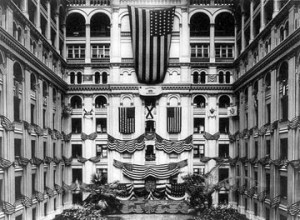 When I visited Washington, D.C. during the 1980s and 90s, I usually stopped by the Old Post Office, famous for its soaring atrium, to listen, learn, and lobby. In the 1970s Nancy Hanks, chair of the National Endowment for the Arts under Nixon, saved the century-old building from demolition, and for 30 years—until Donald Trump signed the lease to turn it into a hotel—the Old Post Office served as a symbolically appropriate home for her agency. Some of my appointments were with successors to Nancy Hanks appointed by Republican presidents after Nixon. Frank Hodsoll, chair of the NEA under Reagan, was key to the regional initiative that advanced art creation, education, and marketing in my bailiwick, South Florida. Later on, in Miami, I interviewed John Frohnmayer, George H.W. Bush’s NEA chair, for a weekly public radio program I hosted in West Palm Beach. The subject of our talk was Leaving Town Alive, the book that Frohmayer (a Stanford-educated lawyer) wrote about his fight for survival in D.C.
When I visited Washington, D.C. during the 1980s and 90s, I usually stopped by the Old Post Office, famous for its soaring atrium, to listen, learn, and lobby. In the 1970s Nancy Hanks, chair of the National Endowment for the Arts under Nixon, saved the century-old building from demolition, and for 30 years—until Donald Trump signed the lease to turn it into a hotel—the Old Post Office served as a symbolically appropriate home for her agency. Some of my appointments were with successors to Nancy Hanks appointed by Republican presidents after Nixon. Frank Hodsoll, chair of the NEA under Reagan, was key to the regional initiative that advanced art creation, education, and marketing in my bailiwick, South Florida. Later on, in Miami, I interviewed John Frohnmayer, George H.W. Bush’s NEA chair, for a weekly public radio program I hosted in West Palm Beach. The subject of our talk was Leaving Town Alive, the book that Frohmayer (a Stanford-educated lawyer) wrote about his fight for survival in D.C.
In the 1970s Nancy Hanks, chair of the National Endowment for the Arts under Nixon, saved the Old Post Office from demolition, and for 30 years—until Donald Trump signed the lease to turn it into a hotel—the historic building served as a symbolically appropriate home for her agency.
Forced out of the home they helped save when it was closed to make way for Trump’s hotel, the NEA and NEH moved to Constitution Center, a modernist monstrosity in Washington, D.C. designed by the architect of the equally hideous Kennedy Center for the Performing Arts. Today Trump International Hotel occupies the historic building at 1100 Pennsylvania Avenue, Donald Trump occupies the historic house at 1600, and the agencies evicted from the Old Post Office in 2014 are experiencing the threat of their lives. The dreadful death cycle dramatized by John Steinbeck in The Grapes of Wrath—eviction and attack followed by extinction—faces the arts and humanities in Donald Trump’s Washington, D.C., where a great public building is now operated for private profit and the public agency responsible for preserving it is about to leave town permanently.
Truth or Twitter? Why Donald Trump Is No John Steinbeck
Donald Trump bragged that someone once called him the Ernest Hemingway of Twitter. Unfortunately for us, the new president possesses neither the courage nor the self-control of Hemingway, winner of the 1954 Nobel Prize in Literature for writing unforgettably about bravery under fire. And as the problems created by Trump-tweets pile up, the source of Trump’s addiction to Twitter has become clear. Eugene Robinson, the Pulitzer Prize-winning Washington Post columnist, described it in words worthy of John Steinbeck: “Trump’s Twitter tantrums are a message of weakness.”
‘Donald Trump’s Twitter tantrums are a message of weakness.’—Eugene Robinson
When I read Trump’s recent Twitter attack on Congressman John Lewis, the venerated civil rights leader who, despite vivid memories and bloody images to the contrary, Trump had the temerity to write was “[a]ll talk, talk, talk – no action or results,” I was reminded of the lecture Toni Morrison gave when she won the Nobel Prize in 1993. Like the speeches of two previous Nobel Prize-winners, William Faulkner and John Steinbeck, her lecture extolled the power of language in explaining and validating human experience. “We die,” she observed. “That may be the meaning of life. But we do language. That may be the measure of our lives.”
‘We die. That may be the meaning of life. But we do language. That may be the measure of our lives.’—Toni Morrison
Echoing George Orwell, Morrison warned that “the systematic looting of language can be recognized by the tendency of its users to forego its nuanced, complex, mid-wifery properties for menace and subjugation.” Foreshadowing Donald Trump’s grade school twitter-burns, she described “language that drinks blood, laps vulnerabilities, tucks its fascist boots under crinolines of respectability and patriotism as it moves relentlessly toward the bottom line and the bottomed-out mind.”
‘Language that drinks blood, laps vulnerabilities, tucks its fascist boots under crinolines of respectability and patriotism as it moves relentlessly toward the bottom line and the bottomed-out mind.’—Toni Morrison
At her popular blog BrainPickings.org, Maria Popova praised Toni Morrison’s lecture as “perhaps our most powerful manifesto for the responsibility embedded in how we wield the tool that stands as the hallmark of our species.” I agree with this assessment, and with Morrison’s Orwell-like admonition. “Whether it is the malign language of law-without-ethics, or language designed for the estrangement of minorities,” she said, “it must be rejected, altered and exposed.”
‘Whether it is the malign language of law-without-ethics, or language designed for the estrangement of minorities, it must be rejected, altered and exposed.’—Toni Morrison
I also agree with Kyle Sammin, the lawyer and writer from Pennsylvania who advised Donald Trump to delete his Twitter account, quoting Calvin Coolidge: “[t]he words of the President have an enormous weight and ought not to be used indiscriminately.” As Toni Morrison noted, Abraham Lincoln provides an even better example of presidential brevity: “When a President of the United States thought about the graveyard his country had become, and said, ‘The world will little note nor long remember what we say here. But it will never forget what they did here,’ his simple words are exhilarating in their life-sustaining properties because they refused to encapsulate the reality of 600, 000 dead men in a cataclysmic race war.”
‘The words of the President have an enormous weight and ought not to be used indiscriminately.’—Calvin Coolidge
By the time Republicans convened in Cleveland last summer, I had already blogged that the Republican nominee for president was the antithesis of Abraham Lincoln. He’s no Coolidge either. Hell, he may not be as good as Dan Quayle, who at least had the sense to stop explaining when he misspelled “potato” at a Trenton, New Jersey elementary school during the 1992 campaign. As Arthur Delaney pointed out in a recent Huffington Post headline, “Donald Trump Can’t Stop Tweeting Mean Things About People.” America’s new president is like a gambler on an all-night binge in Atlantic City, compulsively feeding nickel-and-dime tweets, retweets, and mentions into the slot-machine of his ego.
‘Donald Trump Can’t Stop Tweeting Mean Things About People.’—Huffington Post headline
Since he shows no sign of stopping, Trump would do well to follow the example of John Steinbeck, whose son Thom—also a writer—had this to say about the virtue of authorial self-control during a 2012 interview with Alexander Jaffee. “Ultimately,” he noted, “the greatest amount of time in all writing is spent editing. My father said there’s only one trick to writing, and that’s not writing, that’s writing and rewriting and rewriting and rewriting. Like sculpture. I mean, the first thing off the top of your head isn’t the most brilliant thing you ever thought of. And then when you’re writing about it, when you want others to understand what you’re still talking about, then it really requires that you edit yourself really, really well, so that other people can comprehend it.”
‘My father said there’s only one trick to writing, and that’s not writing, that’s writing and rewriting and rewriting and rewriting.’—Thom Steinbeck
Sadly, Donald Trump has a problem in this area that no amount of self-editing can fix. Describing John Steinbeck’s honesty, Thom wrote: “[e]verything he wrote had truth to it. That’s what he was addicted to. He was addicted to the truth.” As demonstrated by Twitter attacks on true American heroes like John Lewis, Donald Trump has the opposite addiction.
The Hour of the Pearl: John Steinbeck’s America and the Election of Donald Trump
Donald Trump’s upcoming presidential inauguration is seen by many as ushering in a bizarre and unprecedented era, not only for Americans, but also for citizens of other countries. Yet, like similar ceremonies elsewhere, the presidential inauguration is merely a point on a timeline that began decades ago and culminated in the 2016 election. Because the trend is longstanding and disturbing, the outcome at hand threatens to take the course of history in a dangerous direction. Indeed, it might be said that deep beliefs of the American people, and profound principles of American democracy, are at the heart of an evolutionary process which, perhaps inevitably, produced the society reflected in the 2016 election.
For me, chief among the past thinkers who foresaw this most clearly is John Steinbeck, the writer who has most inspired my thinking and my art. For four decades he wrote of his love for America and his hatred of what his countrymen were doing to their country. Though the 2016 election might have been worse, past political campaigns have had their share of ugliness, as Steinbeck wrote in America and Americans, the last book he wrote. In it Steinbeck described the scars left by elections which he observed closely as a citizen, and in which he frequently participated by giving advice and drafting speeches on behalf of Democratic candidates for president. I would like to quote passages from Steinbeck’s writing, starting with America and Americans, to help readers of all cultures and all ages today comprehend Steinbeck’s moral genius in the context of the 2016 election and the upcoming presidential inauguration.
Once the nominations are completed, the campaigns for election begin—hurtful, libelous, nasty, murderous affairs wherein motives are muddied, names and reputations beshitten, families tarred and tawdried, friends and associates mocked, charged and clobbered. . . . In fact, the rules of nonsense are suspended during a Presidential election, as well as memories of honesty and codes of decency. (America and Americans, 1966)
While campaigning in 2015-16, Trump not only bragged about his repeated abuse of women, he also took advantage of campaign speeches to mock and blame women, as stupid men always have, for the infidelities of their men. How any woman could have voted for so misogynistic a man is beyond all reason. But this is only one example of his breathtaking disregard for the necessity and sanctity of societal rules. While insisting on law and order for others, he repeatedly flouted fundamental rules of engagement in past election discourse. In ignoring the traditional imperative of constructive and respectful debate—ridiculing the infirm, insulting opponents, disdaining other races and religions—he highlighted the very worst characteristic of the human species: cruelty.
It is the race, the species that must go staggering on . . . our ugly little species, weak and ugly, torn with insanities, violent and quarrelsome, sensing evil—the only species that knows evil and practices it—the only one that senses cleanliness and is dirty, that knows cruelty and is unbearably cruel. (Burning Bright, 1950)
Over the millennia most of us have learned to obey the rules or suffer punishment for breaking them. But most important, even the rule-breaker knew he was wrong and the others right; the rules were understood and accepted by everyone. . . . Could this be our difficulty, that gradually we are losing our ability to tell the difference? The rules fall away in chunks and in the vacant place we have a generality: ‘It’s alright because everybody does it.’ (America and Americans)
It is a rare morning when our newspapers do not report bribery, malfeasance, and many other forms of cheating on the part of public officials who have used the authority vested in their positions for personal gain. Of course we don’t hear of the honest men, but the danger lies not in the miscreants but in our attitude toward them. Increasingly we lose our feeling of wrong. (America and Americans)
It is probable that here is where morals–integrity, ethics, even charity–have gone. The rules allowed us to survive, to live together and to increase. But if our will to survive is weakened, if our love of life and our memories of a gallant past and faith in a shining future are removed–what need is there for morals or for rules? Even they become a danger. (America and Americans)
In promoting his violent version of authoritarian populism, Donald Trump used outrageous lies, frequently disproved, to foster fear and anger in the American electorate. For example, last August he accused President Obama and Hillary Clinton of “founding” the Islamic State, the same method used by McCarthy to smear citizens and officials he accused of aiding Russia.
. . . as Joseph McCarthy proved, the more ridiculous the charge, the less possibility there is of defense. (America and Americans)
Now for many years we have suckled on fear and fear alone, and there is no good product of fear. Its children are cruelty and deceit and suspicion germinating in our darkness. And just as surely as we are poisoning the air . . . so we are poisoned in our souls by fear, faceless, stupid, sarcomic terror. (Once There Was a War, 1958)
The job insecurity and looming poverty that threatens many Americans has placed real fear in their hearts. Trump succeeded by exploiting this unrest, as well as claims about “illegal immigrants” that are as effective today as they were when Steinbeck used them to plot The Winter of Our Discontent.
Men don’t get knocked out. . . . What kills them is erosion; they get nudged into failure. They get slowly scared . . . It rots your guts. . . . I can’t think beyond next month’s payment on the refrigerator . . . I hate my job and I’m scared I’ll lose it. . . . But I know when you’re sick you need medicine or maybe an operation or maybe a shock. Our people were daring men. You know it. They didn’t let themselves get nibbled to death. And now times are changing. There are opportunities our ancestors never dreamed of. And they’re being picked up by foreigners. Foreigners are taking us over. Wake up . . . . (The Winter of Our Discontent, 1961)
And those who believe that these elements of the 2016 election were without precedent, or are likely to go away soon, are kidding themselves.
Ideas are not dangerous unless they find seeding place in some earth more profound than the mind . . . .they are ineffective without the black earth of discontent to grow in . . . . In each case, the idea is dangerous only when planted in unease and disquietude. But being so planted, growing in such earth, it ceases to be an idea and becomes an emotion. . . . (Sea of Cortez, 1941)
Meanwhile, Donald Trump claimed he was “smart” for avoiding paying taxes without admitting that he did.
If a man has money, he doesn’t ask, ‘Can I afford this?’ but, ‘Can I deduct it?’ Two men fight over a luncheon bill when both of them are going to deduct it anyway—a whole nation conditioned to dishonesty by its laws, because honesty is penalized. (Sweet Thursday, 1954)
There are, I am told, rich men who are willing to be dishonest. I believe I am safe in saying there are none who are willing to admit they are fools. (The Short Reign of Pippin IV, 1957)
We know about our tycoons only when they are giving something away, and their gifts and foundations are usually a means of keeping their money out of the hands of the tax collector. (America and Americans)
Trump also promised to reverse some of America’s most progressive legislation and to “drain the swamp” in Washington, blaming media, political opponents, and intellectual elites for the unrest and suspicion about government that he exploited more effectively than other candidates.
. . . we seem to be in a state of turmoil all the time, both physically and mentally. We are able to believe that our government is weak, stupid, overbearing, dishonest, and inefficient, and at the same time we are deeply convinced that it is the best government in the world, and we would like to impose it on everyone else. (America and Americans)
We shout that we are a nation of laws, not men—and then we proceed to break every law we can if we can get away with it. (America and Americans)
Continuing his assault on progressive government, Trump used anxiety and anger about Islamic terrorism to churn up fear and marginalize Muslims, forgetting one of the most fundamental aspects of America’s success—tolerance, acceptance, and the willingness to help others.
Americans are remarkably kind and hospitable and open with both guests and strangers; and yet they will make a wide circle around the man dying on the pavement. Fortunes are spent getting cats out of trees and dogs out of sewer pipes; but a girl screaming for help in the street draws only slammed doors, closed windows, and silence. (America and Americans)
Trump’s repeated vow as a candidate to name conservatives to the Supreme Court far enough right to satisfy religious fundamentalists is a violation of a core principle guaranteed by the U.S. constitution: the separation of church and state.
We constantly rediscover the excellence of the architecture of our government. It has been proof not only against foreign attack but against our own stupidities, which are sometimes more dangerous. (America and Americans)
The narcissism of Trump’s claim that only he can fix things is clinical in nature, and will prevent him from doing what doesn’t benefit him personally. E pluribus unum: does he know what America’s founding motto means?
The President must be greater than anyone else, but not better than anyone else. (America and Americans)
In the past, unless a president acted illegally, Americans respected both the office and the office holder. This civility has been shredded.
We give the President more work than a man can do, more responsibility than a man should take, more pressure than a man can bear. We abuse him often and rarely praise him. We wear him out, use him up, eat him up. And with all this, Americans have a love for the President that goes beyond loyalty or party nationality; he is ours, and we exercise the right to destroy him. (America and Americans)
But it isn’t enough for those who oppose Donald Trump to blame those who supported him. Americans, all of them, must recognize their own contribution to, and accept responsibility for, the situation in which they find themselves.
In the present climate of whining self-pity, of practiced sickness, of professional goldbricking, of screaming charges about whose fault it is, one hears of very few who do their own time, who take their rap and don’t spread it around. It is as though the quality of responsibility has atrophied. (America and Americans)
Unfortunately, a sense of entitlement to leisure and luxury at impossibly low cost has led to an obese, lazy, solipsistic, violent, substance-dependent population in some sectors of the United States. Blaming foreigners for illegal drugs, to take one example, is unacceptable. If there were no market, there would be no importation.
I strongly suspect that our moral and spiritual disintegration grows out of our lack of experience with plenty. Once, in a novel, I wrote about a woman who said she didn’t want a lot of money. She just wanted enough. To which her husband replied that just enough doesn’t exist. There is no money or not enough money. A billionaire still hasn’t enough money. . . . Having many things seems to create a desire for more things, more clothes, houses, automobiles . . . . We are trapped and entangled in things. (America and Americans)
As a Canadian who has lived in the USA and benefited from its largess, it pains me deeply to witness this insanity. But the truth is that for too long America has touted success without admitting failure—and ignored the existence or validity of cultures in other countries, including Canada.
We in the United States . . . should be taken as a horrible example and our methods avoided by any government and people enlightened enough . . . . (Sea of Cortez)
As a scientist, I’m particularly concerned about a president-elect who ignores science when convenient and who makes frequent unfounded assertions based on hearsay rather than provable fact.
. . . the most dangerous tendency in the world is the desire to believe a rumor rather than to pin down a fact. (A Russian Journal, 1948)
Perhaps the most serious example of this ignorance is Trump’s denial of global warming, which he appeared to take back slightly after being elected. Unfortunately his cabinet appointments confirm the inconvenient truth that, for purposes of governing, he doesn’t believe the climate is really changing—or if it is, that human waste and carbon-dependency is a contributing factor than can or should be checked.
With our own resources we have been prodigal, and our country will not soon lose the scars of our grasping stupidity. (Sea of Cortez)
[The] tendency toward irresponsibility persists in very many of us today; our rivers are poisoned by reckless dumping of sewage and toxic industrial wastes, the air of our cities is filthy and dangerous to breathe from the belching of uncontrolled products from combustion of coal, coke, oil, and gasoline. Our towns are girdled with wreckage and the debris of our toys—our automobiles and our packaged pleasures. Through uninhibited spraying against one enemy we have destroyed the natural balances our survival requires. All these evils can and must be overcome if America and Americans are to survive; but many of us still conduct ourselves as our ancestors did, stealing from the future for our clear and present profit. (America and Americans)
Above all, Donald Trump is a bully’s bully. His blatantly hyperbolic claims during the campaign callously played on the economic fears of Americans while exploiting their pain for his gain. His campaign rhetoric and behavior since winning have made me fearful, too. As a foreigner, I now fear that by setting foot in America I will be subject to the kind of disrespect and violence sanctioned, for the first time in my memory, by the highest office in the land.
Until I have evidence that this fear is unwarranted—and for as long as Donald Trump is president—I have decided not to re-enter the United States. I regret this because I have close friends and family members in America I will miss seeing. But when Americans say they want to be “great again” it sounds to me as if they will only be comfortable when they are once again the dominant “winners” of the world. It reminds me of the bully who tweets almost daily that those who disagree with him are “losers.” Such disrespect makes me feel unwelcome and unsafe in Donald Trump’s America.
When I joined the Advisory Board of the Center for Steinbeck Studies at San Jose State University two years ago, I hoped my work as a Canadian artist, scientist, and humanist would offer a helpful perspective and foster the values espoused by John Steinbeck in his life and writing. As a result of the 2016 election, however, I now fear that America will drift even farther from Steinbeck’s hopeful daylight into the darkness of anger, cynicism, and crude mockery embodied by the president-elect.
I briefly considered resigning my duties on the Steinbeck center’s board; but because I’m an optimist, like Steinbeck, I have decided to stay. I am confident that the pall over America will lift eventually, as day follows night. Meanwhile, technology makes it possible for me to participate in meetings, and Steinbeck’s delicate metaphor of the “hour of the pearl” reminds us that the transition from darkness back to light is a fundamental truth of science, art, and the arc toward justice of human history.
Early morning is a time of magic in Cannery row. In the gray time after the light has come and before the sun has risen, the Row seems to hang suspended out of time in a silvery light. The street lights go out, and the weeds are a brilliant green. The corrugated iron of the canneries glows with the pearly lucence of platinum or old pewter. . . . It is a time of great peace, a deserted time, a little era of rest . . . the air is cool and fresh. . . . Very few people are about, just enough to make it seem more deserted than it is. . . . the hour of the Pearl—the interval between day and night when time stops and examines itself. (Cannery Row, 1945)
Today, on the eve of Donald Trump’s presidential inauguration, I urge self-examination on others, and the resolution to forsake all that Steinbeck felt was the worse in us.
I have named the destroyers of nations: comfort, plenty, and security—out of which grow a bored and slothful cynicism, in which rebellion against the world as it is or myself as I am are submerged in listless self-satisfaction. (America and Americans)
On behalf of SteinbeckNow.com, to which I will continue to contribute, I also urge readers of this post to respond by commenting, or by sharing their thoughts in a guest-author post of their own. Whether or not you agree with my decision to stay away from America until the madness passes, engagement with American values and principles embraced by Steinbeck during his lifetime is to participate in the books he wrote in the way he wanted: actively, with empathy, imagination, and faith that the Hour of the Pearl will come again to our world.
The Hour of the Pearl, oil on canvas by Ron Clavier.
The Winter of Our Discontent Deepens as Trumpettes Party
It’s doubtful either Donald Trump or the minority of Americans who just elected him ever read The Winter of Our Discontent, John Steinbeck’s prophetic fiction about public and private corruption in America 60 years ago. But for fans of the novel the parallels with our winter of discontent today are troubling. Cheating and self-dealing, inequality and incivility, anti-immigrant hatred and hysteria—is the USA less or more selfish today than it was when Steinbeck wrote his cautionary tale? For Donald Trump and his fans among America’s fraction-of-one-percent, personal profit is the golden rule and goodness can measured in tax cuts and capital gains. Add one word to the line from Richard III quoted in Steinbeck’s title—“Now is the winter of our discontent/Made glorious summer by this sun of New York”—and Shakespeare’s metaphor for an English tyrant’s mood aptly expresses the ardor felt by the Trumpettes of Mar-a-Lago, the palatial club in Palm Beach where Trump now holds winter court. I don’t know if John Steinbeck visited Mar-a-Lago. or encountered Donald Trump before he died, but I’ve had the pleasure of both and I’m pretty sure Steinbeck would take a very dim view.
John Steinbeck’s View of Donald Trump and Mar-a-Lago?
Before I moved to California and discovered Steinbeck Country I lived in West Palm Beach, where I ran a prominent nonprofit and played the organ at St. Edward’s Catholic Church, “the Kennedy church,” in Palm Beach. Once I substituted at Bethesda-by-the Sea, the Episcopal church where Trump reportedly received applause from attendees on Christmas Eve. I knew Ralph Wolfe Cowan, the artist who painted the Dorian Gray-like portrait of Trump shown in the lead photo of this post. My home in West Palm Beach wasn’t far from the bridge connecting with Palm Beach near Mar-a-Lago, Donald Trump’s spacious domain, so named because it stretches from Lake Worth to the Atlantic. I passed by often on my way to church, and I was a luncheon and gala guest on those occasions when doing my job entailed hobnobbing.
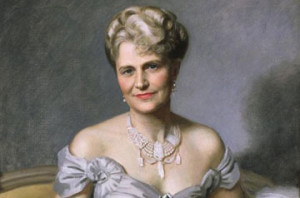 It’s even possible I toured Mar-a-Lago before Donald Trump, who bought it at a discount from descendants of Post cereal heiress Marjorie Merriweather Post in 1985. A year or so earlier a friend of mine arranged for a private look-see at the estate where Post entertained lavishly when John Steinbeck was alive. By the 1980s the mansion’s faded interior resembled Norma Desmond’s living room in Sunset Boulevard—aging, abandoned, populated by the ghosts of parties and partners past—and John Kennedy was the only ex-president with a known Palm Beach address. To fill this gap, Post willed Mar-a-Lago to the government as a presidential retreat when she died. But the property lies under the flight path of Palm Beach airport, adding to security issues, and before Trump came along the Palm Beach social scene had attracted few of Kennedy’s successors. Johnson wasn’t the Palm Beach type, Nixon and Ford and Reagan enjoyed Walter Annenberg’s hospitality in Palm Springs, and the George H.W. Bushes had close ties to the old money on Jupiter Island, a less pretentious winter enclave an hour north of Palm Beach.
It’s even possible I toured Mar-a-Lago before Donald Trump, who bought it at a discount from descendants of Post cereal heiress Marjorie Merriweather Post in 1985. A year or so earlier a friend of mine arranged for a private look-see at the estate where Post entertained lavishly when John Steinbeck was alive. By the 1980s the mansion’s faded interior resembled Norma Desmond’s living room in Sunset Boulevard—aging, abandoned, populated by the ghosts of parties and partners past—and John Kennedy was the only ex-president with a known Palm Beach address. To fill this gap, Post willed Mar-a-Lago to the government as a presidential retreat when she died. But the property lies under the flight path of Palm Beach airport, adding to security issues, and before Trump came along the Palm Beach social scene had attracted few of Kennedy’s successors. Johnson wasn’t the Palm Beach type, Nixon and Ford and Reagan enjoyed Walter Annenberg’s hospitality in Palm Springs, and the George H.W. Bushes had close ties to the old money on Jupiter Island, a less pretentious winter enclave an hour north of Palm Beach.
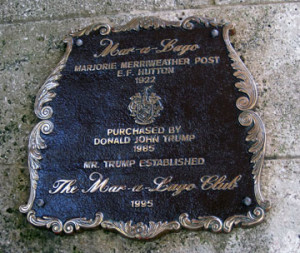 Palm Beach prejudice presented another problem. Kennedy wasn’t welcome everywhere, even as president, and top-tier social clubs like the one across the road from Mar-a-Lago excluded Catholics and Jews from membership as recently as my time. To his credit, Donald Trump thumbed his nose at this tradition when he opened Mar-a-Lago Club for those with sufficient cash and cachet, regardless of race or religion, in 1995. As a marketing strategy his open-door policy was a winner, attracting socialites and business leaders and making Mar-a-Lago a popular venue for black-tie charity events. Trump’s inauguration committee may be having trouble signing talent, but name entertainers like Vic Damone loved playing Mar-a-Lago, and the evening I spent chatting with Diahann Carroll, Vic’s wife at the time, is my warmest memory of the place. Vanity Fair covered Mar-a-Lago favorably almost from the start, though the tone changed after the editor of the magazine described Trump as a “short-fingered vulgarian.” (“How Donald Trump Beat Palm Society and Won the Fight for Mar-a-Lago“ was a source of images for this post.)
Palm Beach prejudice presented another problem. Kennedy wasn’t welcome everywhere, even as president, and top-tier social clubs like the one across the road from Mar-a-Lago excluded Catholics and Jews from membership as recently as my time. To his credit, Donald Trump thumbed his nose at this tradition when he opened Mar-a-Lago Club for those with sufficient cash and cachet, regardless of race or religion, in 1995. As a marketing strategy his open-door policy was a winner, attracting socialites and business leaders and making Mar-a-Lago a popular venue for black-tie charity events. Trump’s inauguration committee may be having trouble signing talent, but name entertainers like Vic Damone loved playing Mar-a-Lago, and the evening I spent chatting with Diahann Carroll, Vic’s wife at the time, is my warmest memory of the place. Vanity Fair covered Mar-a-Lago favorably almost from the start, though the tone changed after the editor of the magazine described Trump as a “short-fingered vulgarian.” (“How Donald Trump Beat Palm Society and Won the Fight for Mar-a-Lago“ was a source of images for this post.)
 In 2003 my organization was celebrating its 25th anniversary when the publisher and a retinue from Vanity Fair flew to town in preparation for an expose of Palm Beach social mores. One of the writers in the group—the late Christopher Hitchens, a regular contributor to Vanity Fair—invited me to tag along when a Republican billionaire with a household name hosted dinner at a Palm Beach club that still banned Jews. Rather late in life Hitchens had learned that his maternal grandmother was Jewish, a topic of conversation as we waited outside the club, so I suggested that he ask for a kosher menu once we were inside and seated for dinner. The next day I got a call from the head of the Palm Beach cultural venue where my organization’s anniversary event was about to be held. It happened that his board chairman was an officer of the club—a thin-skinned millionaire who learned, almost instantly, about our quiet indiscretion the night before. I wrote the requisite letter of apology and agreed to keep my mouth shut about the incident, but Christopher seemed gratified when I reported the result to him. He said it proved our point perfectly.
In 2003 my organization was celebrating its 25th anniversary when the publisher and a retinue from Vanity Fair flew to town in preparation for an expose of Palm Beach social mores. One of the writers in the group—the late Christopher Hitchens, a regular contributor to Vanity Fair—invited me to tag along when a Republican billionaire with a household name hosted dinner at a Palm Beach club that still banned Jews. Rather late in life Hitchens had learned that his maternal grandmother was Jewish, a topic of conversation as we waited outside the club, so I suggested that he ask for a kosher menu once we were inside and seated for dinner. The next day I got a call from the head of the Palm Beach cultural venue where my organization’s anniversary event was about to be held. It happened that his board chairman was an officer of the club—a thin-skinned millionaire who learned, almost instantly, about our quiet indiscretion the night before. I wrote the requisite letter of apology and agreed to keep my mouth shut about the incident, but Christopher seemed gratified when I reported the result to him. He said it proved our point perfectly.
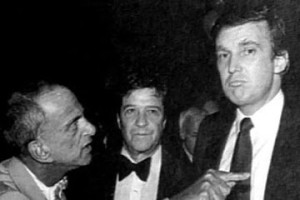 Like John Steinbeck, a writer he admired, Christopher Hitchens was politically astute, egalitarian, and courageous under fire from bullies, Left or Right. Like Steinbeck, he supported America’s pursuit of an unpopular war (in Hitchens’s case, Iraq; in Steinbeck’s, Vietnam) and bravely paid the price. Like Steinbeck, he distrusted power, disliked braggadocio, and detested xenophobia, insult, and incitement to mob violence of the kind seen more than once during Donald Trump’s campaign for president. Roy Cohn, the McCarthy-era lawyer who taught Trump how to play New York hardball, was anathema to Hitchens, as he’d been to Steinbeck when The Winter of Our Discontent was written. The odious combination of compulsive mendacity, obsessive opportunism, and pathological aggression that repelled Steinbeck advanced Cohn’s career and attracted clients. One of them was Donald Trump, the billionaire developer described by Hitchens in 1997 as a “bankrupt real-estate monarch [who] can treat the skyline as his own without any hint of a nasty creditors’ meeting at any of his numerous and lenient banks.” Trump’s Palm Beach ascendancy might have amused Hitchens. But I think it would offend Steinbeck, who ridiculed small-town ambition and conspicuous consumption in The Winter of Our Discontent.
Like John Steinbeck, a writer he admired, Christopher Hitchens was politically astute, egalitarian, and courageous under fire from bullies, Left or Right. Like Steinbeck, he supported America’s pursuit of an unpopular war (in Hitchens’s case, Iraq; in Steinbeck’s, Vietnam) and bravely paid the price. Like Steinbeck, he distrusted power, disliked braggadocio, and detested xenophobia, insult, and incitement to mob violence of the kind seen more than once during Donald Trump’s campaign for president. Roy Cohn, the McCarthy-era lawyer who taught Trump how to play New York hardball, was anathema to Hitchens, as he’d been to Steinbeck when The Winter of Our Discontent was written. The odious combination of compulsive mendacity, obsessive opportunism, and pathological aggression that repelled Steinbeck advanced Cohn’s career and attracted clients. One of them was Donald Trump, the billionaire developer described by Hitchens in 1997 as a “bankrupt real-estate monarch [who] can treat the skyline as his own without any hint of a nasty creditors’ meeting at any of his numerous and lenient banks.” Trump’s Palm Beach ascendancy might have amused Hitchens. But I think it would offend Steinbeck, who ridiculed small-town ambition and conspicuous consumption in The Winter of Our Discontent.
Steinbeck’s California Dreads What Palm Beach Celebrates
 I am unacquainted with the four Trumpettes who posed for Vanity Fair in front of Ralph Cowan’s painting of Donald Trump. But I recognized names from the past when I read reports about holiday festivities at Mar-a-Lago. An outspoken Trumpette quoted by national media outlets once worked for the Democratic county commissioner from West Palm Beach. On New Year’s Day the Palm Beach daily newspaper published an admonishing letter to readers in which she promised that “President-elect Trump will make us financially secure again” and described “the days of massive government waste and corruption” as a thing of the past caused (presumably) by Democrats. Today, more than 30 years after I first met this woman and a decade after leaving Florida for California, I feel about Donald Trump’s Palm Beach as John Steinbeck felt about Salinas, his home town. I’m grateful for the memories but sad for the “dear little town” I used to know. As Mar-a-Lago celebrates and Washington gets ready, the winter of our discontent grows darker by the day here in his home state.
I am unacquainted with the four Trumpettes who posed for Vanity Fair in front of Ralph Cowan’s painting of Donald Trump. But I recognized names from the past when I read reports about holiday festivities at Mar-a-Lago. An outspoken Trumpette quoted by national media outlets once worked for the Democratic county commissioner from West Palm Beach. On New Year’s Day the Palm Beach daily newspaper published an admonishing letter to readers in which she promised that “President-elect Trump will make us financially secure again” and described “the days of massive government waste and corruption” as a thing of the past caused (presumably) by Democrats. Today, more than 30 years after I first met this woman and a decade after leaving Florida for California, I feel about Donald Trump’s Palm Beach as John Steinbeck felt about Salinas, his home town. I’m grateful for the memories but sad for the “dear little town” I used to know. As Mar-a-Lago celebrates and Washington gets ready, the winter of our discontent grows darker by the day here in his home state.
Childhood’s End: Life Poem On the Eve of Donald Trump
Childhood’s End
Back then, I followed my mother around
looking for approval and was shortchanged.
What is a life if not learning the difference
between enough and not nearly enough.
I recall that she had a hillbilly-simple rage.
Which, most often, she might aim at herself;
but, sometimes, at anyone nearby. And me.
I learned, later, that she’d been a hired girl
for a bed. Meals. Clearly, she was ashamed.
Still, she was proud of what she had learned.
That you overcome poverty, maybe anything,
by working for what is, always and repeatedly,
less than you need. A bedside table was books:
Gone with the Wind by Margaret Mitchell and
scholarly works on the antebellum South. She
was born in Letcher County, Kentucky. After
the War of Northern Aggression, and Slavery.
She read to forget. We’d climb in the Chevy,
drive downtown. Into the city. To the library.
And she’d be patient (then less so) as I chose.
Maybe Childhood’s End by Arthur C. Clarke.
Aliens have landed. Taken over. Have hooves,
horns, a reptilian tail. And attitude. Like my
mother who knew what it takes just to live.
